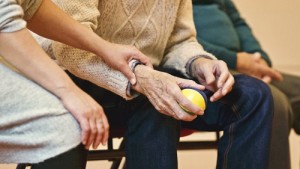How to know if a senior is hiding dementia symptoms
 Recognizing the signs that could suggest your loved one or a senior in your care is hiding dementia symptoms can be difficult.
Recognizing the signs that could suggest your loved one or a senior in your care is hiding dementia symptoms can be difficult.
What you need to know about dementia, first and foremost, is that it is not specifically a disease. The term ‘dementia’ is used to describe a group of symptoms linked to memory decline or cognitive impairment. Alzheimer’s is however a disease and the most common type of dementia; accounting for 60 to 80 percent of cases. The second most common type is vascular dementia and its onset occurs after a stroke.
Dementia Symptoms
A senior suffering from dementia will experience varying symptoms such as:
- Memory loss
- Reasoning and judgment issues
- Inability to focus and pay attention
- Language and communication issues
At least two of the symptoms from the list above must be present for the senior to be diagnosed with dementia. Many of the symptoms noted can start out gradually and progressively get worse. Professional evaluation is paramount to verify diagnosis and detect if the dementia is treatable. Early diagnosis enables the senior to get the best from treatments available, while providing opportunities to participate in studies and even trials. Most importantly, an early diagnosis provides time to plan for the future and make important decisions about care.
Dementia Care Tips
Doing the research about a care plan for your loved one or senior during early diagnosis is key. Given the circumstances, it ensures that you are preparing the dementia suffer and managing expectations as best as possible. Please check out our blog, 5 Dementia Care Tips to learn the effective communication tools and practices to decide how to meet the needs of a senior or loved one with dementia.
If you believe your loved one is hiding or disguising any of these symptoms you can start with an open dialogue and observe their responses. If they are reticent or struggling with basic everyday tasks and you sense denial, there is a strong likelihood that they are hiding dementia symptoms. Try not to get frustrated with your loved one or the senior in your care. Instead, seek professional advice on the topic and conduct some research on dementia.
Differentiating Denial
Sometimes what appears as denial is in fact agnosia, the total lack of awareness of memory loss or cognitive impairment, which affects many suffers of Alzheimer’s disease.
If you have reached a point where you have consulted with the senior’s primary care physician and the recommendation is to take the next steps in addressing a care plan for your loved one, please reach out to Paradise Living Centers. We have three beautiful residences in the city of Phoenix; Paradise Valley, North Central Phoenix and Arcadia and our Care Manager, Kristie Chadwick is a Certified Dementia Practitioner (CDP©) with years of experience in guiding families and caregivers who must make decisions about the care of their loved ones.
To set up an appointment or tour our homes, please call (480) 878-4112. We look forward to becoming your partners in care.
 The process of deciding the best living situation for an elderly parent or loved one can be challenging. At a certain point, you may be forced to face the daunting decision of moving your family member from their own home into an assisted living center or group home. But how do you know when it is time for an
The process of deciding the best living situation for an elderly parent or loved one can be challenging. At a certain point, you may be forced to face the daunting decision of moving your family member from their own home into an assisted living center or group home. But how do you know when it is time for an  As adults age, it can be harder to do some of the activities enjoyed in their youth—but loss of abilities does not mean the end of good times. One of the best things you can do for your senior loved ones is encourage engagement in elderly activities. Staying active is good for their physical and emotional health and also helps maintain cognitive skills and mobility. If you are looking for ideas on what to suggest or try, here are some of the best activities for seniors:
As adults age, it can be harder to do some of the activities enjoyed in their youth—but loss of abilities does not mean the end of good times. One of the best things you can do for your senior loved ones is encourage engagement in elderly activities. Staying active is good for their physical and emotional health and also helps maintain cognitive skills and mobility. If you are looking for ideas on what to suggest or try, here are some of the best activities for seniors:
 When you are trying to decide whether to
When you are trying to decide whether to  Caring for a loved one with dementia can be difficult and often times a strain for family members sharing in the care responsibilities and decisions. Although there will inevitably be challenges, there are communication tools and practices you can learn to better address the needs of your loved one with dementia. Here are five
Caring for a loved one with dementia can be difficult and often times a strain for family members sharing in the care responsibilities and decisions. Although there will inevitably be challenges, there are communication tools and practices you can learn to better address the needs of your loved one with dementia. Here are five 
 There are many myths about senior nutrition. Most people think that the importance of nutrition diminishes as a person ages. However, it is quite the opposite. At Paradise Living Centers, we cater to the nutritional and dietary needs of each resident. Our cook who prepares meals daily for our residents living at each of our homes, works closely with the caregivers and our nurse to address any changes or preferences. Mealtime can be a social time for our seniors, which is also important for their health. In this blog, we will dispel 5 of the most common senior nutrition myths:
There are many myths about senior nutrition. Most people think that the importance of nutrition diminishes as a person ages. However, it is quite the opposite. At Paradise Living Centers, we cater to the nutritional and dietary needs of each resident. Our cook who prepares meals daily for our residents living at each of our homes, works closely with the caregivers and our nurse to address any changes or preferences. Mealtime can be a social time for our seniors, which is also important for their health. In this blog, we will dispel 5 of the most common senior nutrition myths: When touring
When touring